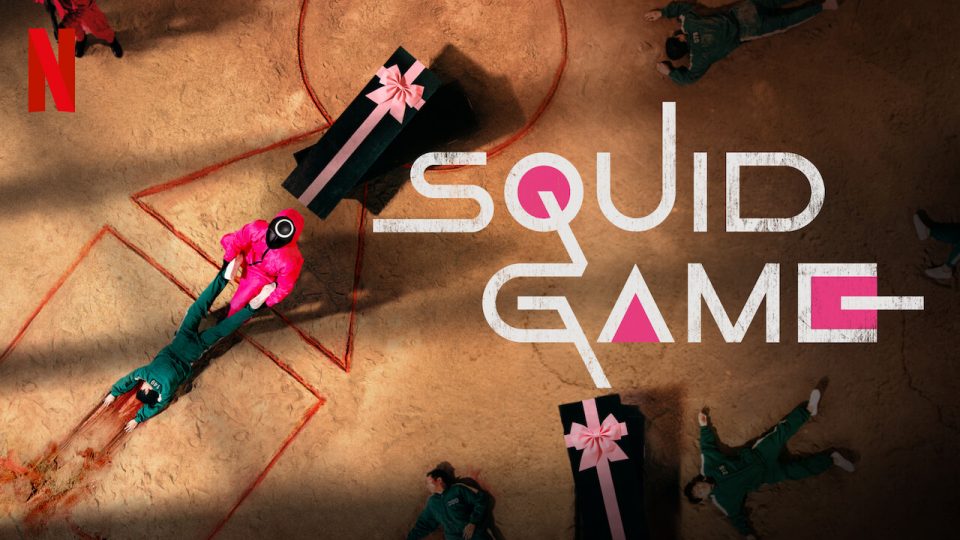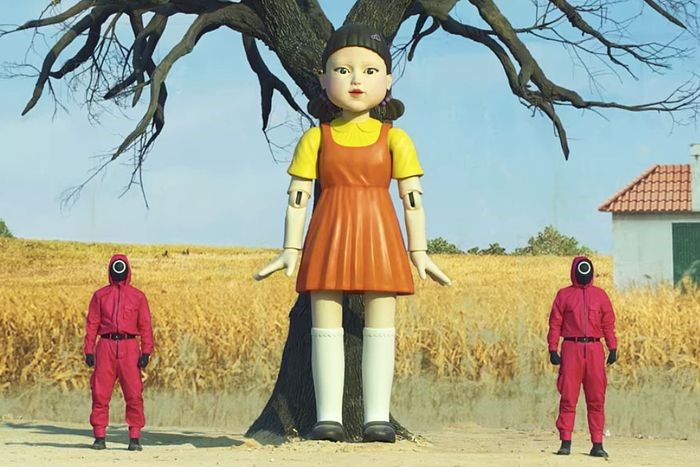
Squid Game: The fascinating story behind Netflix's most-watched series

Netflix claims ‘Squid Game’ is their biggest grosser having notched up 111 million views. A “mind-boggling” 142 million accounts have already checked out this original series, a dark survival-competition series out of South Korea.
The Korean Cultural Centre in Dubai has conducted a real-life ‘Squid Game’ sans the bloodshed and gore. A South Korean Internet service provider has sued Netflix for the exponential rise in traffic because of the popularity of the nine-episode series.
In a post-game interview, the NBA star Lebron James had said he didn’t like the way ‘Squid Game’ ended. It is evident the web series has gained a lot of fame as we see merchandises and apparels from the series have started to appear in the platform’s markets, with even some cafes springing up based on the ‘Squid Game’ theme.
The characters appeal to the modern-day bourgeois
 So, what makes ‘Squid Game’, a ruthless game of survival, so popular? It is meant to be a comment on how the bored, filthy rich and ultra-capitalist society creates a sense of despair in the poor. And, the plot revolves around characters that represent the modern day, poor working class.
So, what makes ‘Squid Game’, a ruthless game of survival, so popular? It is meant to be a comment on how the bored, filthy rich and ultra-capitalist society creates a sense of despair in the poor. And, the plot revolves around characters that represent the modern day, poor working class.
The protagonist, Gi-Hun (who turns out to be Mr Nice Guy in this tale that shines a light on the ugly side of human nature) ekes out his living doing small jobs. He is a gambling addict, a divorcee who lives with his mother. His little daughter, who he adores stays with his ex-wife and step-father, and he never has money to buy her a good birthday present. Also, he’s on the run from a mean bunch of loan sharks who when they catch him threaten to gouge out his eyes and remove other organs in his body to sell them off.
Under pressure, Gi-Hun agrees to participate in a deadly game with a mind-boggling amount of prize money organized by “masked” men to pay off his debt and to become a good father to his daughter.
Also read: Why OTT platforms in India need to step out of IIM mindset
Another main character is Cho Sango-Woo, a businessman who has graduated from the famous Seoul National University, and is the local boy who has done well for himself. However, he is facing financial ruin and has a debt of 6 billion south Korean won. He is portrayed as very ambitious, a zealot and a cut-throat when it comes to survival.
Sae-Byok, is another key participant, who has turned ruthless because she has to get her mother out of north Korea and rescue her little brother from an orphanage. She starts off as being cold-hearted but slowly she turns out to be as “human” as Gi-Hun.
Il-Nam is seemingly a genial, elderly man who has a brain tumour. He participates in the game claiming he might as well play a game of death, instead of waiting for it to visit him. The old man has less to lose in this game. Deok-Su is a gangster who is also on the run having notched up massive gambling debts and he is being chased by hit-men to be killed. He is self-centered, a goon who uses brute force to get things done his way.
Mi-Nyeo is a woman who is manipulative and desperate to survive, her character is not etched out properly and she disappears for a while in the game.
Indian actor Abdul plays a Pakistani immigrant living in Seoul, a blue-collared worker who lives with his wife and kids. He has fought with his boss and is running from the law, and he desperately needs money to get his family out. Abdul is a soft, innocent guy among this raggedy bunch.
All the characters are grappling with their sad and melancholic lives. And, they are pushed against the wall and desperate enough to do anything for money. At first, the participants are repelled by the idea that you can lose your life in this game – the losers in the first game are ruthlessly gunned down. But when money is poured into a crystal ball hanging at the centre of the room in which the participants have to live in, they play on. They are desperate to even gamble away their lives.
It is sad as you cannot stop relating it to the rat race we live in.
Not all child’s play
 Though, reality survival games like Big Boss exist all over the world in different countries and languages, ‘Squid Game’ appeals largely due to the unbelievable gore and ruthless killing that unfolds as part of the game. Though the contrasting mint green and pink colors and hypnotic geometric sets in the series are meant to evoke nostalgia of childhood, it also alters our perception of reality. The philosophy of sheer betrayal becomes like mere business transactions, desolation becomes daily life and cunning becomes the culture.
Though, reality survival games like Big Boss exist all over the world in different countries and languages, ‘Squid Game’ appeals largely due to the unbelievable gore and ruthless killing that unfolds as part of the game. Though the contrasting mint green and pink colors and hypnotic geometric sets in the series are meant to evoke nostalgia of childhood, it also alters our perception of reality. The philosophy of sheer betrayal becomes like mere business transactions, desolation becomes daily life and cunning becomes the culture.
Also read: Netflix will change the way it ranks its most popular titles
Here, elimination doesn’t mean you leave without winning a penny. Instead, you leave in a coffin and you end up being incinerated. Participants are eliminated if they fail to win the challenge of each game. It can get mentally tiring watching the participants being bumped off or hurtling down from heights smashing their skulls to pieces.
All this bloodshed makes your brain fuzzy leaving the viewer with a sense of helplessness. The suspense is meant to build up as the number of participants are rapidly dropping as they are also allowed to ‘eliminate’ each other at night in a free for all.
Ultimately, it transpires that this game has been sponsored by a bunch of rich business men. Masked up, they watch from a special gallery as the game nears its feverish pitch. Only one person can walk off with the prize money. ‘Squid Game’ is ostensibly taking a dig at how big business tycoons in contemporary modern-day society have power over decision-making which affects our daily lives.
Might is right here. When Deok-Su (the gangster in debt) steals food after a game and deprives others, the organiser (the man with a glistening black mask) lets this pass by without any intervention. Though, the organisers have announced that the games have to be played fair and square and no cheating would be allowed.
Sarvs Saga, an engineer turned full-time YouTuber, runs a YouTube channel ‘Plip Plip’ with a strong following among ‘rationalist millennials’. His roast videos on Kollywood films, political trolls etc., have received 68 million views until now.

Talking about ‘Squid Game’, Sarvs says that it is not the gore and bloodshed shown in the series that is disturbing. But, what shakes you up is the fact that human empathy starts to decline among the participants as they keep moving on to the next round. Sarvs adds that this is somewhat similar to the modern, competitive lifestyle of millennials today.
Peer pressure also makes young people watch this kind of a series, says Sarv.
In the final round of ‘Squid Game’, there’s not much guesswork required to know who will take the cash prize home. Also, after all this build-up, you feel let down when Gi-Hun finally meets the person who has scripted this game. The reason he gives, for staging such a game, in which all the participants except one meet a violent end, is just not convincing enough.
Isn’t it surprising that the tastes of viewers have changed from sitcoms like ‘The Office’, ‘Big Bang Theory’ to a rather depressing series that shows nothing but gore reality? Maybe, it is symptomatic of the troubled times we live in. It is probably a way to escape the reality around us.

